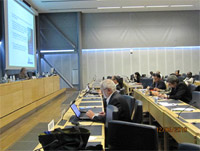UNESCO hosted the fifth Facilitation Meeting of WSIS Action Line “Media”: Community Media for Disaster Preparedness at WSIS Forum 2010
31-05-2010 (Paris)

Fifth Facilitation Meeting of WSIS Action
Line “Media”
© UNESCO
For the fifth consecutive year UNESCO convened on 12 May at the WSIS Forum 2010 in Geneva a facilitation meeting on WSIS Action Line C9 “Media”. The meeting reported on updates of the Action Line outcomes as well as organized a debate on “Community Media for Disaster Preparedness”.
At the reporting session, UNESCO, IAMCR, AMARC, respectively presented implementation updates in regard to freedom of expression, media development, media education and community media. The representative from ITU gave a special presentation on Transition from Analogue to Digital Terrestrial Broadcasting.
UNESCO has conducted a series of activities in the four areas of C9. UNESCO just celebrated World Press Freedom Day in Brisbane, Australia on 3 May focussing on Freedom of Information as a tool to advance empowerment, good governance, transparency, accountability and the fight against corruption. The UNESCO International Programme for the Development of Communication (IPDC), which celebrated its 30th anniversary in 2010, has continued to play its role as a very important resource mobilization mechanism for fostering media development. UNESCO’s comprehensive set of Media Development Indicators (MDIs) has been recognized as a major standard-setting tool by stakeholders and United Nations agencies dealing with media development and good governance.
In the area of media education, IAMCR reported significant progress of media education in terms international policy making, curriculum development and research. AMARC reported on significant developments in community media in Argentina, Armenia, Australia, Bangladesh, Belize, Bolivia, Brazil, Cameroon, Cote d’Ivoire, East Timor, Gabon, Gambia, Ghana, India, Jamaica, Mozambique, Nepal, Somalia, Thailand, Uganda, United Kingdom, Uruguay, Zambia.
Given community media’s big role in disaster preparedness and reduction, the thematic part of the meeting brought speakers to share their experience in Haiti, Chile, DRC. Community broadcasters responding to the earthquakes in Haiti and Chile have illustrated the vital importance of access to media, communications and connectivity in times of disaster. In DRC, community radio stations play an important role to provide information about volcanoes and environment preservation.
UNESCO has conducted a series of activities in the four areas of C9. UNESCO just celebrated World Press Freedom Day in Brisbane, Australia on 3 May focussing on Freedom of Information as a tool to advance empowerment, good governance, transparency, accountability and the fight against corruption. The UNESCO International Programme for the Development of Communication (IPDC), which celebrated its 30th anniversary in 2010, has continued to play its role as a very important resource mobilization mechanism for fostering media development. UNESCO’s comprehensive set of Media Development Indicators (MDIs) has been recognized as a major standard-setting tool by stakeholders and United Nations agencies dealing with media development and good governance.
In the area of media education, IAMCR reported significant progress of media education in terms international policy making, curriculum development and research. AMARC reported on significant developments in community media in Argentina, Armenia, Australia, Bangladesh, Belize, Bolivia, Brazil, Cameroon, Cote d’Ivoire, East Timor, Gabon, Gambia, Ghana, India, Jamaica, Mozambique, Nepal, Somalia, Thailand, Uganda, United Kingdom, Uruguay, Zambia.
Given community media’s big role in disaster preparedness and reduction, the thematic part of the meeting brought speakers to share their experience in Haiti, Chile, DRC. Community broadcasters responding to the earthquakes in Haiti and Chile have illustrated the vital importance of access to media, communications and connectivity in times of disaster. In DRC, community radio stations play an important role to provide information about volcanoes and environment preservation.
Related themes/countries
· UNESCO and WSIS
· Switzerland
· Weekly newsletter
Share this story:
Contact information
- UNESCO
Source














